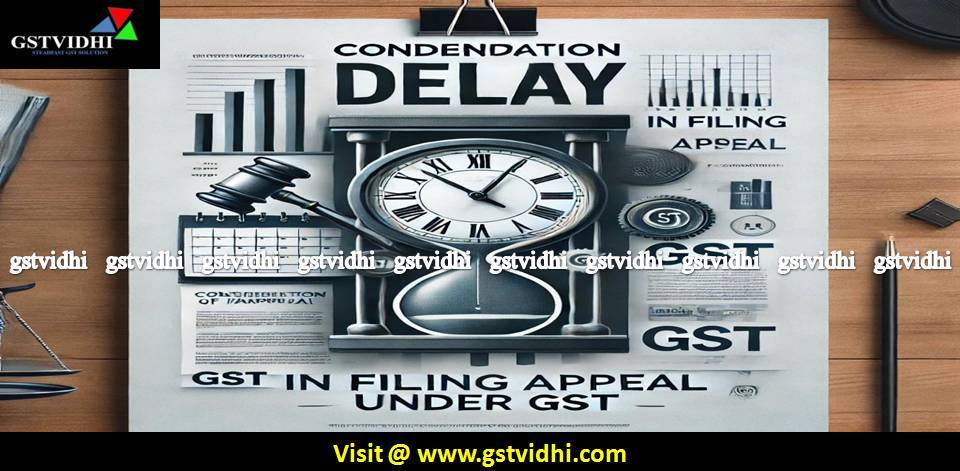
Case Analysis: S.K. Chakraborty
& Sons vs. Union of India & Others
By Yogesh Verma (CS/LLB) / 2 min read / GST Case Law
Introduction
The case of S.K. Chakraborty & Sons vs. Union of India & Others is
a significant ruling delivered by the Calcutta High Court, Circuit Bench at
Jalpaiguri, addressing the applicability of the Limitation Act, 1963, to
appeals under the Goods and Services Tax (GST) law. The court's decision on
whether appellate authorities under Section 107 of the GST Act can condone
delays beyond the statutorily prescribed period has important implications for
taxpayers and GST administration.
Case Details
- Court: High Court at Calcutta, Circuit Bench at Jalpaiguri
- Judges: Hon'ble Justice Debangsu Basak and Hon'ble Justice
Md. Shabbar Rashidi
- Case
Number: M.A.T. 81 and 82 of 2022
- Judgment
Date: December 1, 2023
- Appeal
Against: Orders dated March 24, 2021,
and March 13, 2021, passed in WPA 133 and WPA 107 of 2021.
Background
The appellant, S.K. Chakraborty & Sons, a partnership
firm, was served a show cause notice on September 12, 2018, alleging
suppression of sales for the financial years 2017-18 and 2018-19. Following an
assessment order dated April 23, 2019, the appellant filed an appeal on
December 16, 2019, exceeding the statutory 60-day limitation period.
The appellate authority rejected the appeal, citing the
limitation prescribed under Section 107 of the West Bengal GST Act, 2017, which
does not permit condonation of delays beyond an additional 30 days. The
appellant filed writ petitions challenging this rejection. Both writ petitions
were dismissed by the Single Bench, upholding the appellate authority's decision.
Legal Provisions Discussed
1.
Section
107 of the GST Act: Governs appeals to the appellate
authority, prescribing a limitation period of three months, extendable by an
additional one month at the discretion of the appellate authority.
2.
Section 5
of the Limitation Act, 1963: Allows
condonation of delays if sufficient cause is demonstrated, provided the
provisions are not expressly excluded by a special statute.
3.
Section
29(2) of the Limitation Act: States
that the Limitation Act applies to special or local laws unless specifically
excluded.
Issues Framed
1.
Whether Section 5 of the Limitation
Act applies to the limitation period prescribed under Section 107 of the GST
Act.
2.
Whether the appellate authority has
the jurisdiction to condone delays beyond the aggregate 60-day period specified
in Section 107.
Submissions by the Parties
Appellant
1.
Argued that Section 107 of the GST
Act does not explicitly exclude the applicability of the Limitation Act.
2.
Cited judicial precedents where the
Limitation Act was held applicable to special statutes.
3.
Requested condonation of delay based
on sufficient cause, asserting that justice demands flexibility in exceptional
circumstances.
Respondents
1.
Contended that the limitation period
under Section 107 is final and binding, leaving no room for condonation beyond
the statutory extension.
2.
Relied on precedents, such as New
India Assurance Company Ltd vs. Hilli Multipurpose Cold Storage Pvt. Ltd.,
where the Supreme Court restricted extensions beyond statutory limits.
Findings of the Court
1.
Applicability
of the Limitation Act:
o The court held that Section 107 of the GST Act does not
expressly or impliedly exclude the applicability of Section 5 of the Limitation
Act.
o By invoking Section 29(2) of the Limitation Act, the court
found that appellate authorities can condone delays beyond the prescribed
period if sufficient cause is shown.
2.
Nature of
the Appeal Limitation:
o The court emphasized that justice should not be sacrificed
at the altar of procedural rigidity.
o It observed that in exceptional circumstances, an extension
beyond the statutory period is permissible under Section 5 of the Limitation
Act.
3.
Impugned
Orders Set Aside:
o The orders of the Single Bench and the appellate authority
were quashed.
o The appellate authority was directed to reassess the
application for condonation of delay based on its merits.
4.
Justice-Oriented
Approach:
o The court remarked that litigation should focus on
substantive justice rather than technical procedural barriers.
Judgment
The court ruled in favor of the appellant, allowing the
appellate authority to consider the delay condonation application on its
merits. It emphasized that a rigid interpretation of limitation provisions
should not override the principles of justice and fairness.
Conclusion
The judgment in S.K. Chakraborty & Sons vs. Union of
India & Others clarifies that the provisions of the Limitation Act,
1963, are applicable to GST appeals unless explicitly excluded. By allowing
flexibility in condoning delays, the court has reinforced the importance of
substantive justice over procedural technicalities
Disclaimer: All the Information is based on the notification, circular and order issued by the Govt. authority and judgement delivered by the court or the authority information is strictly for educational purposes and on the basis of our best understanding of laws & not binding on anyone.
Find the Attachment (Press on Click Here )
Click here